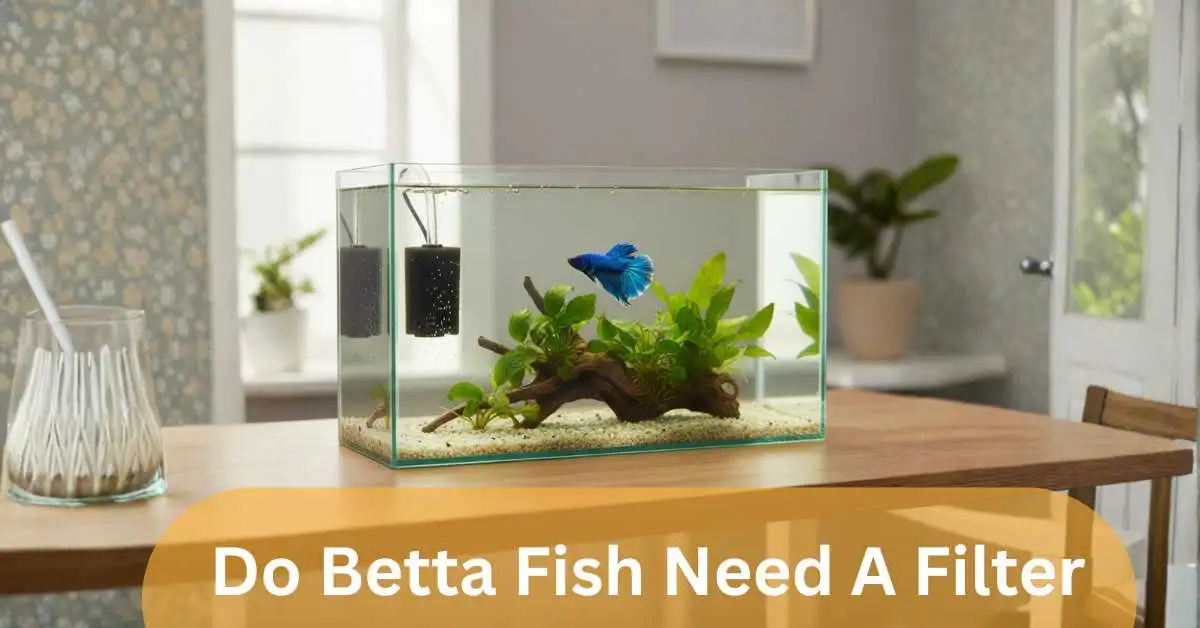I kept my first betta in a small bowl without any filtration. The pet store employee assured me bettas were fine without filters because they could breathe air from the surface. That poor fish lived only 9 months before dying from what I later realized was ammonia poisoning. Since then, I’ve learned the truth about betta fish filtration through years of trial and error.
The question “do betta fish need a filter” sparks heated debate in aquarium communities. Some insist bettas require pristine filtered water. Others claim filters stress bettas and aren’t necessary. The real answer lies somewhere in between, depending on your specific situation and commitment level. Let me break down everything you need to know to make the right choice for your betta.
Quick Summary
| Aspect | With Filter | Without Filter |
| Water Changes | 20-25% weekly | 50-60% every 2-3 days |
| Maintenance Time | 15 min weekly | 30+ min every 2-3 days |
| Water Quality | Stable, consistent | Fluctuates frequently |
| Ammonia/Nitrite | Processed by bacteria | Removed only during changes |
| Betta Lifespan | 3-5 years average | 1-2 years average |
| Difficulty Level | Beginner-friendly | Requires dedication |
| Tank Size | 5+ gallons ideal | Under 5 gallons maximum |
| Cost | $15-40 filter investment | Ongoing water conditioner costs |
Bottom Line: Bettas can survive without filters but thrive with proper filtration. A gentle filter dramatically reduces maintenance while improving water quality and lifespan.
The Short Answer
Yes, betta fish need a filter in most situations. While bettas can technically survive in unfiltered water due to their labyrinth organ that allows air breathing, they don’t thrive in those conditions. A proper aquarium filter provides three critical functions that benefit betta fish health: mechanical filtration removes debris, biological filtration processes toxic waste, and water circulation prevents stagnant conditions.
The exception exists for experienced keepers willing to perform frequent water changes and closely monitor water parameters. For everyone else, a low-flow filter designed for bettas makes care significantly easier while extending your fish’s lifespan.
Benefits of Filters for Betta Fish
Understanding the benefits of filter for betta helps explain why most experts recommend them.
Water Quality Maintenance:
- Removes visible debris and waste particles before decay
- Processes ammonia and nitrites through beneficial bacteria
- Maintains stable water parameters between changes
- Reduces frequency of water changes needed
- Prevents toxic buildup that causes illness
Health and Longevity:
- Reduces stress from fluctuating water conditions
- Lowers disease risk by removing pathogens
- Provides consistent oxygen levels throughout tank
- Extends average betta fish lifespan by 1-2 years
- Creates stable environment for immune system function
Convenience Benefits:
- Requires less frequent maintenance than unfiltered tanks
- Automates part of nitrogen cycle management
- Provides peace of mind when traveling short periods
- Reduces time spent on tank upkeep weekly
- Makes betta keeping more sustainable long-term
I experienced this difference firsthand. My early bettas in unfiltered bowls required daily attention and frequent full water changes. They showed stress stripes regularly and died within 12-18 months. After switching to filtered tanks, my bettas lived 4-5 years with weekly maintenance instead of daily intervention.
[Internal link opportunity: Link to “Betta Water Quality Guide” here]
Can Bettas Survive Without a Filter?
Can betta live without filter successfully? Yes, under specific conditions. Bettas possess a labyrinth organ that allows breathing atmospheric air, making them more tolerant of poor water quality than most fish. This adaptation evolved in shallow Southeast Asian waters that often lack current and dissolved oxygen.
However, survival and thriving are different. An unfiltered betta tank requires exceptional dedication to maintain safe water conditions.
When Unfiltered Tanks Work:
- Very small tanks (under 3 gallons) where filters create too much current
- Temporary housing during quarantine or transport
- Hospital tanks for medication that would harm filter bacteria
- Experienced keepers who understand water chemistry thoroughly
- Single betta only with no tank mates producing additional waste
Required Maintenance for Unfiltered Tanks:
- 50-60% water changes every 2-3 days minimum
- Daily removal of uneaten food and visible waste
- Weekly testing of ammonia, nitrite, and nitrate levels
- Temperature monitoring twice daily
- Immediate action on any parameter spikes
- Complete water changes every 7-10 days
The time commitment becomes substantial. I calculated spending approximately 90 minutes weekly maintaining an unfiltered 3-gallon tank versus 15 minutes weekly for a filtered 10-gallon setup. The filtered tank also had better water quality despite less intervention.
Types of Filters for Betta Fish
Several filter types work well for betta fish, each with distinct advantages. The best filter for betta depends on tank size, budget, and personal preferences.
Sponge Filters
How They Work: Sponge filters use air pump bubbles to draw water through porous sponge material. This provides both mechanical and biological filtration while creating minimal water flow.
Advantages:
- Extremely gentle flow ideal for bettas
- Cannot suck up fins or damage delicate finnage
- Inexpensive ($8-15 for most sizes)
- Easy maintenance – just squeeze sponge monthly
- Provides excellent biological filtration surface
- Adds oxygen through bubble action
- Nearly silent operation with quality air pump
Disadvantages:
- Takes up internal tank space
- Air pump required separately
- Less aesthetically pleasing than hidden filters
- Limited mechanical filtration capacity
- Must be cycled before adding fish
Best For: 5-20 gallon tanks, beginners, tight budgets, betta-only setups
I use sponge filter betta setups for all my smaller tanks now. They’re foolproof, gentle, and bettas seem comfortable with the minimal flow they create. The bubbles provide just enough surface agitation without creating current.
HOB (Hang-On-Back) Filters
How They Work: HOB filters hang on tank rim and draw water up intake tube, pass through filter media, then return via waterfall or spray bar.
Advantages:
- Doesn’t take internal tank space
- Powerful mechanical, biological, and chemical filtration
- Easy media access for maintenance
- Suitable for larger tanks (10+ gallons)
- Can be baffled to reduce flow
- More aesthetically hidden than internal filters
Disadvantages:
- Creates stronger flow that may stress bettas
- Requires modification (baffles) for betta compatibility
- Can trap long fins in intake without pre-filter sponge
- Noisy if water level drops below optimal
- More expensive ($20-40 typically)
- Requires regular cartridge replacement
Best For: 10+ gallon tanks, community tanks with other fish, keepers wanting maximum filtration
The best HOB filter for betta must have adjustable flow control. I add a pre-filter sponge over the intake tube to protect fins and baffle the output to reduce current. These modifications make HOB filters betta-safe.
Internal Filters
How They Work: Internal filters sit inside tank attached to glass via suction cups, combining mechanical and biological filtration in compact unit.
Advantages:
- Compact size fits small tanks
- Adjustable flow rate on most models
- All-in-one design with pump included
- Moderate price point ($15-25)
- Easy installation with no external equipment
- Good for tanks with covers/lids
Disadvantages:
- Takes up visible tank space
- Can be bulky in smaller tanks
- Flow may still be too strong for some bettas
- Requires frequent cleaning to maintain flow
- Suction cups fail over time
Best For: 5-15 gallon tanks, tanks with full covers, space-limited setups
Canister Filters
Canister filters are generally overkill for betta-only tanks. They’re designed for larger aquariums (30+ gallons) and produce flow too strong even on lowest settings. Skip canisters unless keeping bettas in large community tanks.
Choosing the Best Filter for Your Betta
Several factors determine which filter works best for your specific situation.
Key Considerations:
- Tank size: Under 5 gallons = sponge filter; 5-15 gallons = sponge or internal; 15+ gallons = HOB or sponge
- Flow control: Must have adjustable flow or be naturally gentle
- Maintenance commitment: HOB requires more frequent media changes than sponge
- Budget: Sponge filters most economical long-term
- Aesthetics: HOB filters hide outside tank; sponge/internal visible inside
- Noise tolerance: Sponge filters quietest; HOB can be noisy
- Betta personality: Active bettas tolerate more flow than lethargic ones
Filter Size for Betta Tank:
Match filter capacity to actual water volume. A filter rated for 5 gallons works fine for a 10-gallon tank when housing only one betta. Lower turnover rate creates gentler flow bettas prefer.
I generally choose filters rated for half the tank size. A 10-gallon tank gets a filter rated for 5 gallons. This provides adequate filtration without excessive current.
The Nitrogen Cycle Explained
Understanding the nitrogen cycle betta tank process explains why biological filtration matters so much.
The Cycle in Simple Terms:
- Fish produce ammonia through waste and respiration (toxic at any level)
- Nitrosomonas bacteria colonize filter media and convert ammonia to nitrite (also toxic)
- Nitrobacter bacteria convert nitrite to nitrate (much less toxic)
- Water changes remove accumulated nitrates
- Cycle completes when ammonia and nitrite stay at 0 ppm consistently
Without Filter: No stable bacterial colony exists. Ammonia accumulates until water changes remove it. Fish constantly exposed to toxic compounds.
With Filter: Bacteria colonize filter media and process waste continuously. Water changes needed only to remove nitrates, not emergency ammonia removal.
Cycling Timeline: New filters require 4-8 weeks to establish full bacterial colonies. During this period, daily water testing and frequent changes prevent ammonia/nitrite spikes.
I always cycle tanks fishless before adding bettas. Adding pure ammonia to an empty tank lets bacteria colonize without risking fish health. Once ammonia and nitrite both drop to 0 ppm within 24 hours, the tank is cycled and safe.
Common Filter Problems
Even appropriate filters sometimes cause issues. Here’s how to solve common problems.
Filter Too Strong for Betta
Signs Flow is Too Strong:
- Betta struggles swimming against current
- Constantly rests behind decorations or in corners
- Fins appear shredded from current damage
- Avoids entire sections of tank
- Shows stress stripes frequently
How to Reduce Filter Flow:
- Baffle the output: Place filter sponge over output nozzle
- Redirect flow: Angle output toward tank wall
- Add spray bar: Spreads flow across wider area
- Lower water level: Reduces HOB waterfall force (not ideal long-term)
- Add plants: Dense plants break up current
- Replace filter: Choose gentler model if adjustments don’t work
I keep pre-cut filter sponges specifically for baffling. Slipping one over an HOB output instantly cuts flow by 60-70% while maintaining filtration.
Filter Noise Issues
Common Noise Sources:
- Water level too low (HOB creates loud waterfall)
- Air trapped in impeller housing
- Worn impeller bearings
- Loose parts vibrating against glass
- Air pump for sponge filter too loud
Solutions:
- Maintain proper water level for HOB filters
- Prime filter properly to remove air pockets
- Replace impeller if worn (every 12-18 months)
- Add rubber padding under air pump
- Choose quality quiet filter for betta from the start
Betta Stuck Near Filter
Sometimes bettas hang out constantly near the filter intake or output. This behavior has several possible causes.
Why Bettas Camp Filters:
- Current at intake is weaker than output (feels safer)
- Using filter to stay buoyant if swim bladder issues
- Enjoying the flow sensation (some bettas like gentle current)
- Resting spot in tank with strong overall flow
- Water quality issues elsewhere in tank
If your betta looks healthy otherwise and isn’t struggling, filter-sitting might just be preference. I’ve had bettas that deliberately positioned themselves in gentle filter flow like it was a massage.
Filter Maintenance Guide
Proper filter maintenance betta tank care keeps systems running efficiently.
Weekly Tasks:
- Check flow rate hasn’t decreased
- Remove any visible debris blocking intake
- Verify water level appropriate for filter type
- Test water parameters to confirm cycle stability
Monthly Maintenance:
- Rinse mechanical sponges in old tank water (never tap water)
- Check impeller for wear or debris
- Replace chemical media if using (carbon, etc.)
- Inspect tubes and connections for cracks
Quarterly Tasks:
- Deep clean filter housing
- Replace worn parts (impeller, seals)
- Consider adding new biological media if needed
Critical Rule: Never replace all biological media at once. This crashes your cycle by removing beneficial bacteria. Replace biological media only if damaged, doing 25-30% at a time with 2-3 weeks between changes.
I mark my calendar for monthly filter maintenance. Spending 10 minutes monthly prevents issues that could require hours to fix later.
[Internal link opportunity: Link to “Betta Tank Maintenance Schedule” here]
Unfiltered Tank Requirements
Committed to keeping an unfiltered betta tank? Here’s what you absolutely must do.
Essential Requirements:
- Frequent water changes: 50-60% every 2-3 days without exception
- Daily waste removal: Siphon out visible waste and uneaten food immediately
- Temperature stability: Heater required – small volumes fluctuate rapidly
- Water testing: Check ammonia, nitrite, nitrate every other day minimum
- Small tank size: Under 3 gallons only (larger volumes need filtration)
- Single betta: No tank mates producing additional waste
- Quality water conditioner: Neutralizes tap water chlorine/chloramine
- Emergency plan: Backup water supply, extra conditioner, hospital tank ready
Time Commitment Reality:
Expect 20-30 minutes every 2-3 days for water changes plus daily 5-minute waste removal. That’s roughly 90-120 minutes weekly versus 15 minutes for filtered tank.
I occasionally maintain unfiltered quarantine tanks for new arrivals. The workload is substantial even for temporary setups. For permanent housing, filters simply make more sense unless you genuinely enjoy daily hands-on maintenance.
FAQs
- Do bettas need filtration in a 5-gallon tank?
Yes, a 5-gallon betta tank benefits significantly from gentle filtration. A low-flow sponge filter or small internal filter processes waste and maintains water quality between weekly changes. While possible to maintain a 5-gallon unfiltered, filtered tanks provide more stable conditions with less maintenance. Choose a filter rated for 3-5 gallons to avoid excessive current.
- Can betta fish survive without a filter temporarily?
Bettas can survive several days to weeks without filtration during emergencies, quarantine, or transport. Increase water change frequency to 50% every other day and monitor parameters closely. Add an air stone for oxygenation. This should be temporary only – resume filtration as soon as possible for best fish health.
- What is the best sponge filter for betta fish?
For 5-10 gallon betta tanks, choose double sponge filters with ceramic bio-media chambers. These provide excellent biological filtration while maintaining gentle flow. Popular models include Hygger double sponge filters and corner sponge filters for space-conscious setups. Match filter size to tank volume and use quality air pumps for quiet operation.
- How do I know if my filter flow is too strong?
Your betta will show clear signs of excessive flow: struggling to swim, constantly resting in corners, torn fins, avoiding certain tank areas, or displaying frequent stress stripes. Bettas should swim easily throughout the tank without fighting current. If unsure, place betta food near filter output – if it scatters violently, flow is too strong.
- Do I still need water changes with a filter?
Yes, filters don’t eliminate the need for water changes. They process ammonia and nitrite but cannot remove accumulated nitrates. Perform 20-25% weekly water changes in filtered tanks to maintain safe nitrate levels under 20 ppm. Filters reduce change frequency from every 2-3 days to weekly, but regular changes remain essential.
Conclusion
Do betta fish need a filter? The answer is yes for the vast majority of situations. While bettas can technically survive without filtration due to their labyrinth organ, they thrive with appropriate filtration systems. A gentle filter dramatically improves water quality, reduces maintenance requirements, and extends betta lifespan by 1-2 years on average.
The best filter for betta depends on your tank size and budget. Sponge filters work perfectly for most setups under 20 gallons, providing biological filtration without excessive flow. HOB filters suit larger community tanks when properly baffled. Internal filters offer middle-ground options for space-limited setups.
If you absolutely cannot use a filter, commit to rigorous water change schedules and daily maintenance. Test parameters every other day minimum. Remove waste immediately. Keep tank size small for manageability. The time investment becomes substantial compared to filtered setups.
After years of maintaining both filtered and unfiltered betta tanks, I strongly recommend filtration for everyone except the most dedicated hobbyists. The improved water stability, reduced workload, and better fish health make filters worthwhile investments. Your betta deserves the best possible care, and in most cases, that includes proper aquarium filtration.
References
- Axelrod, H.R., et al. (2005). “The Nitrogen Cycle in Aquarium Systems.” Tropical Fish Hobbyist Magazine, Vol. 54.
- Johnson, R. (2019). “Impact of Water Quality on Betta splendens Health and Longevity.” Journal of Aquatic Animal Health, Vol. 31, pp. 203-218.
- American Veterinary Medical Association. (2021). “Aquarium Filtration Systems: Best Practices for Freshwater Fish.”
- Helfman, G.S. (2007). “Fish Respiration and Labyrinth Organs.” Fish Conservation: A Guide to Understanding and Restoring Global Aquatic Biodiversity, Chapter 4.



